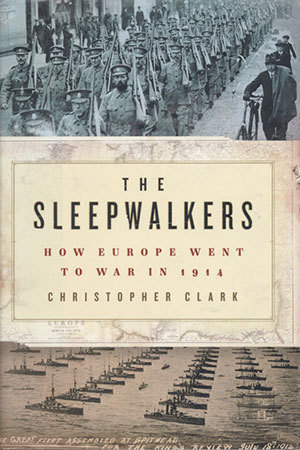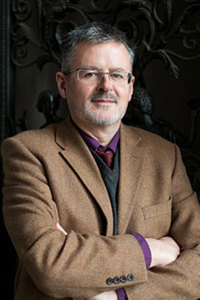 “The Sleepwalkers: How Europe Went to War in 1914” by Christopher Clark
“The Sleepwalkers: How Europe Went to War in 1914” by Christopher Clark
The Nanovic Institute for European Studies at the University of Notre Dame has awarded the 2015 Laura Shannon Prize in Contemporary European Studies to Christopher Clark for his book “The Sleepwalkers: How Europe Went to War in 1914,” published by Harper. A. James McAdams, director of the Nanovic Institute, praised the book for “the masterful treatment of one of the greatest turning points in modern history” and “its accessibility to all readers.”
The $10,000 Laura Shannon Prize is presented annually to the author of the best book in European studies that transcends a focus on any one country, state or people to stimulate new ways of thinking about contemporary Europe as a whole, and recognizes alternately books in the humanities and in history and social sciences. The 2015 award cycle considered books in history and social sciences published in 2012 and 2013. Clark, the Regius Professor of History at St. Catharine’s College at the University of Cambridge, will accept the award and present a lecture in the 2015 fall semester at the University of Notre Dame.
The members of the final jury were Doris Bergen, Chancellor Rose and Ray Wolfe Professor of Holocaust Studies, University of Toronto; Archie Brown, emeritus professor of politics, St. Antony’s College, University of Oxford; Anna Grzymala-Busse, Ronald and Eileen Weiser Professor of Political Science, University of Michigan; John Van Engen, Andrew V. Tackes Professor of Medieval History, University of Notre Dame; and Michael Zuckert, Nancy R. Dreux Professor of Political Science, University of Notre Dame.
 Christopher Clark
Christopher Clark
The jury commended Clark’s book, stating: “‘The Sleepwalkers: How Europe Went to War in 1914’ is an amazing work of history writing. Uncommonly insightful, it combines fresh and thorough research in the primary sources, complete knowledge of the secondary literature and a sure-footed ability both to analyze complex events and set them out in a compelling narrative. The book adds greatly to our knowledge and understanding of the war’s origins, keeping the focus initially on the Serbian question, which gives the story a sense of locality and contingency. With an impressive range of linguistic skills, Clark brings out the complexity of how momentous foreign policy decisions were reached in Austria, Germany, Russia, Great Britain, France, Serbia, Hungary, Italy and the Ottoman Empire. In the end, ‘The Sleepwalkers’ reveals how the particularities of politics and other structural factors are not isolated and merely contingent but, like what Machiavelli called Fortuna, combine and interact to produce large events in history like the First World War. It is not merely the best account we have of the event it explores, but a model for historical explanation altogether.”
The Nanovic Institute for European Studies at the University of Notre Dame is committed to enriching the intellectual culture of Notre Dame by creating an integrated, interdisciplinary home for students and faculty to explore the evolving ideas, cultures, beliefs and institutions that shape Europe today. For additional information about the Nanovic Institute and the Laura Shannon Prize, visit nanovic.nd.edu.
Contact: Monica Caro, Nanovic Institute, 574-631-3547, mcaro@nd.edu